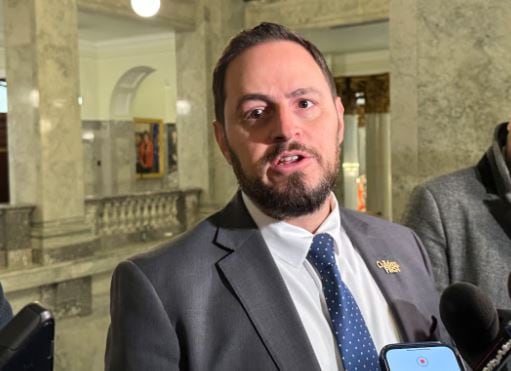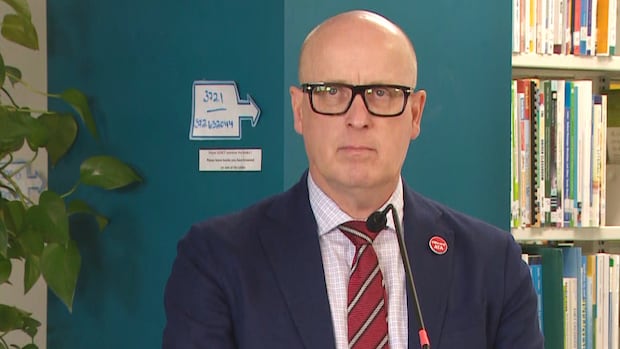The Alberta Teachers’ Association says it will use every legal avenue it can to challenge the provincial government’s Back to School Act.
Using procedural shortcuts, the Alberta government passed the bill early Tuesday, just hours after it was introduced in the legislature, forcing 51,000 teachers back to work Wednesday and imposing a new four-year contract that 90 per cent of teachers had already voted to reject.
The Back to School Act invokes the notwithstanding clause pre-emptively, preventing the ATA from bargaining or striking until September 2028 and blocking a court from overturning the law in the event of a successful Charter challenge.
“Teachers will comply with the law, but make no mistake, compliance is not consent,” ATA president Jason Schilling said at a press conference in Edmonton on Tuesday. “The association will fight this abuse of power with every tool the law provides, and every ounce of conviction we possess.”
Schilling said a legal team is assessing the ATA’s options to challenge the legislation, which was proclaimed into law on Tuesday. The Back to School Act gives the government permission to breach rights articulated in the Canadian Charter of Rights and Freedoms, the Alberta Bill of Rights and the Alberta Human Rights Act.
The ATA’s goal is to overturn the use of the notwithstanding clause, either by legal means or public pressure, Schilling said.
Alberta Teachers’ Association president Jason Schilling didn’t hold back when asked about his reaction to who was present when the province passed legislation on Monday that will force teachers back into classrooms, adding he saw tears in the eyes of teachers who were in attendance.
Human rights organizations also weighed in on Tuesday, condemning the Alberta government for usurping teachers’ right to bargain collectively.
In a statement, Amnesty International Canada said the Alberta government is violating teachers’ right to strike, their freedom of expression, freedom of association and right to peaceful assembly.
“Alberta’s use of the notwithstanding clause continues an alarming trend of provincial governments putting political expediency ahead of people’s human rights,” Ketty Nivyabandi, the secretary general of Amnesty International Canada’s English-speaking section, said in a news release.
The Canadian Civil Liberties Association called the legislation a dangerous abuse of power.
“If Alberta can use the notwithstanding clause now without consequence, it will not hesitate to do so again — and so will other governments,” executive director Howard Sapers said in a statement.
Labour organizations, including the Alberta Union of Provincial Employees, the Canadian Labour Congress and Unifor, have also panned the legislation, saying it puts all workers’ rights at risk.
Alberta labour leaders are slated to announce a co-ordinated response in Edmonton on Wednesday afternoon.
The president of the Alberta Teachers’ Association called the government’s use of the notwithstanding clause to force teachers back to work ‘an abuse of power’ and warned that other labour rights could be under threat.
In an interview on Monday, Athabasca University human resources and labour relations professor Jason Foster said the legislation is a turning point for unionized workers.
“What they are signalling in this bill today is that fair and free collective bargaining for the public sector in Alberta is dead, because they will just do whatever they want to do regardless,” he said.
NDP Leader Naheed Nenshi pledged to introduce legislation to limit the provincial government’s use of the notwithstanding clause, should his party form government in the future.
Promises of school improvements
Government ministers on Tuesday defended their actions as necessary to return children to class after teachers walked off the job Oct. 6 and shuttered schools.
“At some point, teachers’ rights to strike bleed in and prevent kids’ right to an education, and it’s up to the government to balance those rights,” Finance Minister Nate Horner said during question period.
Alberta Education Minister Demetrios Nicolaides says his government’s use of the Constitution’s notwithstanding clause was ‘necessary’ to get students back in the classroom. ‘We couldn’t risk any further delay,’ says Nicolaides.
Ministers have justified use of the notwithstanding clause by pointing to the unique way teachers bargain with their employers. Expensive issues such as pay are bargained at a central table with a committee of school board and government representatives. Questions of time allotted for professional development and preparation — and bursaries for education — are bargained at 61 different tables with individual school boards.
The notwithstanding clause prevents teachers from negotiating at both levels until 2028.
Horner said in the legislature on Tuesday that the government worried about teachers staging localized strikes, and it has “very little tolerance” for school to be interrupted again.

Education Minister Demetrios Nicolaides has pledged to spend $100 million more per year during the next three years to hire 1,500 more educational assistants (EAs) and speed up testing for students with possible deficits.
The government has also pledged to pay for 3,000 more teaching positions by 2028, although the province’s education funding formula would already entitle growing school boards to increased funding for staff.
“These are immediate changes that our schools will see,” Nicolaides said in the legislature Tuesday.
“They’ll see more teachers coming into the classroom over the next few months. They’ll see more teachers and EAs. That’ll help decrease class sizes and provide students with tailored support that they need to succeed.”
It’s unclear when school boards will receive those extra funds.
Nicolaides has also said the government will create an education task force to address concerns about large class sizes with growing numbers of students who have complex needs.
He promised to restore the collection of class size and complexity data from school divisions, six years after his UCP government ordered school boards to stop collecting and reporting that data to the province.
In 2023, UCP MLAs voted against an NDP private member’s bill to restore class size and complexity data collection.
Nicolaides told reporters on Tuesday he can’t commit to spending more money than already allotted this budget year to implement his new task force’s recommendations.
He said the government hasn’t yet decided whether it will require Alberta schools to add extra minutes or days to their school calendar to make up for the 16 days of cancelled classes during teacher job action.
There are about 750,000 students enrolled in more than 2,000 public, Catholic and francophone schools in Alberta.
NDP education critic Amanda Chapman said Tuesday it is “completely unbelievable” that the minister’s pledges for extra staff will make a noticeable improvement in classrooms across the province.
“It is a drop in the bucket,” she said. “It is not enough.
“There are schools that need to add five or six EAs to deal with the complexity in their classrooms — minimum.”
The ATA has also said the pledge is inadequate to compensate for what it says are years of inadequate funding for public education.
The Opposition has also questioned how Alberta will be able to attract and retain teachers while their right to bargain is suspended by the Back to School Act.
www.cbc.ca (Article Sourced Website)
#Alberta #Teachers #Association #vows #bargaining #rights #court #CBC #News



